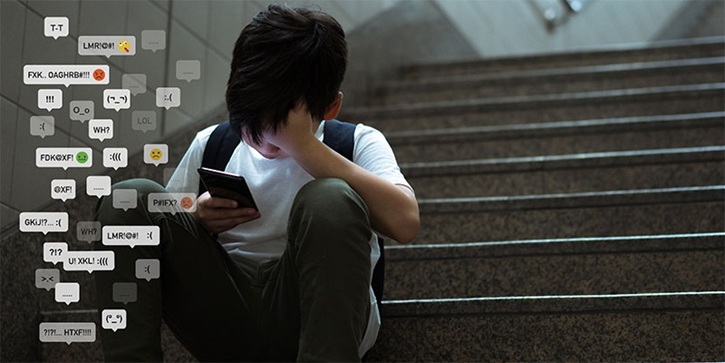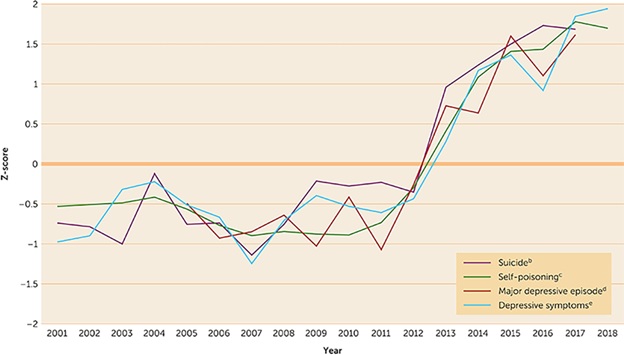
Before you hand your kid a phone, read this
- Stephen McBride
- |
- May 27, 2025
- |
- Comments
This article appears courtesy of RiskHedge.
Editor’s note: Happy Memorial Day. Our office and the markets are closed, but we’re sharing this timeless essay from Stephen. It’s a message to all parents... one Stephen takes very seriously. He’s been writing about this idea for a long time—and now, thankfully, more and more people are coming around...
***
Here’s what scares me.
It’s not a stock market crash, or some rogue artificial intelligence taking over the world and killing us all.
It’s our phones.
Yes, you read that right. I’m really worried about that supercomputer you carry around in your pocket all day.
Specifically, the harm they’re causing our kids...
If you’re a parent, this is one of the most important essays you’ll read all year. And please don’t ignore the five actions to take at the end.
Maybe you’ve made money from RiskHedge recommendations in the past. I promise you these ideas will pay more “dividends” than any stock, ever.
- A while back, I attended a private conference where Matt Ridley was speaking.
If you don’t know Matt, he’s a bestselling author and one of the world’s most important thinkers.
I was lucky enough to shake Matt’s hand and thank him for writing The Rational Optimist: How Prosperity Evolves—a book about the triumph of humanity.
In short, this book changed my life. It helped me see what was right with the world instead of focusing on the constant doom and gloom. Today, Matt and I are spreading the word through our growing Rational Optimist Society, which you can join here.
By most measures, life is better than ever. In 1950, one in every four kids died before their 15th birthday. Now, fewer than one in 20 pass away prematurely.
If you were alive in the 1800s, there was a 90% chance you were illiterate. Today, more than 86% of the global population can read and write.
- But one troubling trend is on the rise…
In 2017, psychologist Jean Twenge conducted a study into the mental health of girls between the ages of 12 and 15.
Below is a chart from her research. It measures suicide, self-poisoning, and depression among tweens.

Source: Psychiatry Online
Suicide attempts are up. Depression is way up.
The kids are not alright.
Other studies arrived at the same conclusion. A CDC study found suicide rates among Americans between the ages of 10 and 24 have jumped nearly 60% over the past 15 years.
Look at that chart again. You can see that something really bad happened between 2011 and 2012.
- All evidence points to the same suspects…
The lethal combination of smartphones and social media.
The iPhone debuted in 2007. But 50% of Americans didn’t own one until 2012.
That was also the year social media giant Meta Platforms (META) pivoted to a “mobile-first” strategy. This changed EVERYTHING.
When you had to sit down in front of a computer to check Facebook, you only logged in every so often. But Facebook’s iPhone accessibility allowed you to constantly scroll through your feed.
Whether you were commuting to work… cooking dinner… or nodding off to bed… your social media page was always right at your fingertips.
2012 was also the year teen depression started going parabolic. Coincidence? I don’t think so.
More than a decade into this experiment, evidence is mounting that smartphones and social media are a lethal combination for teen mental health.
Cambridge University researchers looked at 84,000 people of all ages and found that social media was strongly associated with worsening mental health.
Other studies show ditching apps like Facebook leads to significant improvements in well-being, depression, and anxiety.
- Remember when smoking was cool?
The rugged Marlboro Man still makes me want to run out and buy a pack of cigarettes.
For my parents’ generation, most of the cool people smoked. If you wanted to hang out with the cool guys, you had to smoke, too.
So, lots of people took up smoking—and everyone was sicker and poorer as a result.
iPhones and Instagram are the new cigarettes. It’s what all the cool kids do.
I could spend the next five pages explaining all the reasons why smartphones and social media are bad. They expose us to grim news 24/7… increase social isolation… and just one video of you doing or saying something socially “unacceptable” can ruin your life.
But let’s home in on the most toxic problem with smartphones and social media—the one which likely explains why suicide among teen girls is at record highs.
Social media is a highlight reel of life.
It’s all pearly white teeth and perfect bodies. Luxurious vacations on clear-water beaches and $500 futomaki platters in Nobu.
This tricked teens—who spend up to nine hours a day staring at screens—into thinking social media highlights are what real life is like all the time.
In short, social media creates an unrealistic image of life. Teens look around and ask, “Why am I not lying on a Caribbean beach and staying in five-star hotels?”
- The good news? Awareness of this problem is growing.
More parents, educators, and lawmakers are waking up to the damage social media is causing our kids. And they’re starting to act.
In 2023, Florida became the first state to ban phones in all public school classrooms. Two years later, half of all states have similar laws in place—with more likely to follow close behind.
And according to Pew Research, nearly 40% of teens have admitted they’re on their phone too much and have cut back on social media scrolling. That’s huge!
I believe this is the start of a real cultural shift away from smartphones and social media.
People are pushing back against this “mind virus.” What will you do to keep the momentum going?
- As a father of three young kids, here’s my advice…
First, don’t think it won’t happen to you.
If your kids spend hours on their phones and social media, the mind virus will infect them.
Banning their phones completely likely won’t work, either.
Try telling your teens they aren’t allowed the one thing all their friends have (and use all day) and see how it goes. Becoming a digital hermit isn’t the path toward making friends.
Instead, you must lead by example. Don’t tell your kids to stay off social media while simultaneously scrolling through Facebook.
Show them with your actions that this stuff is toxic sludge they should avoid when possible.
Here are five practical ways to do this. Insist your kids follow these rules, too.
- Don’t ever access social media on your phone. No scrolling, ever.
- Don’t play games on your phone.
- When you are at home, don’t have your phone next to you unless you’re expecting an important work call. Put it in a special place so you won’t constantly check it. Be present.
- Turn off all non-essential notifications, including email. That’s what your office is for.
- Introduce a “smartphone swear jar.” Anyone who breaks the above rules gets fined $5 for each offense.
I’m working hard to keep my kids off social media and to minimize their use of smartphones for as long as I can.
But the day will come when they ask for both. It’s my job to limit that desire in their minds before it even begins.
Dad’s never on his phone or engrossed in social media. I want to be like Dad.
Stephen McBride
Chief Analyst, RiskHedge
PS: It’s easy to get stuck doomscrolling... but I want my kids—and your kids and grandkids—to know the truth. The world is bursting with opportunities. And they’re so much better than the media will have you believe.
That’s why I started The Rational Optimist Society with Matt Ridley. It isn’t just about consuming better media. It’s about creating a movement. Together, we’ll build a community that celebrates progress, fosters innovation, and inspires the next generation to dream big.
If you’d like to join us, go here. Matt just wrote about the huge CRISPR announcement...

This article appears courtesy of RH Research LLC. RiskHedge publishes investment research and is independent of Mauldin Economics. Mauldin Economics may earn an affiliate commission from purchases you make at RiskHedge.com
